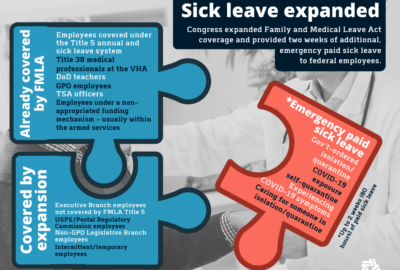

House Oversight and Reform Committee Chairwoman Carolyn Maloney (D-N.Y.) and Government Operations Subcommittee Chairman Gerry Connolly (D-Va.) have a long list...
Two of the top leaders on the House Oversight and Reform Committee have a long list of legislative proposals they want to see included in the next coronavirus rescue package for federal employees and contractors.
Committee Chairwoman Carolyn Maloney (D-N.Y.) and Government Operations Subcommittee Chairman Gerry Connolly (D-Va.) developed a list of priorities after speaking with federal leaders and other stakeholders, they said Monday in a letter addressed to congressional leadership.
“These priorities do not exhaust the support that our federal civil service and its contractors need,” Maloney and Connolly said. “But they will provide clarity, improve federal government operations and help federal workers care for their families during this public health crisis. We respectfully ask you to include these provisions in the forthcoming coronavirus relief package.”
Perhaps most notably, the two chairmen are proposing childcare reimbursements, worth up $2,000 per month, for federal employees who are required to report to the office or duty station.
Two other proposals would have major implications for participants in the Federal Employee Health Benefits Program.
First, Maloney and Connolly recommended allowing federal employees to change or opt into new insurance plans during a health emergency like the current pandemic.
Currently, FEHB participants have one chance a year, usually a four-week “open season,” to make changes to their health insurance plan.
In addition, the chairmen suggested allowing employees to extend eligibility for their federal health, dental and vision benefits to qualifying dependents for an additional year. Some children, for example, may age out of their family’s current health plans during the coronavirus pandemic, they said.
Many of their legislative proposals are an attempt to codify or clarify existing guidance from the Office of Personnel Management, but some policies have been inconsistently implemented throughout the administration and have even varied within individual agencies.
Maloney and Connolly proposed, for example, requiring agencies to provide weather and safety leave to their employees who can’t perform their work from their typical duty stations due to the coronavirus — unless they serve in a national security role .
They’re also seeking clarification that federal employees can work from home with children or sick family members present.
“This provision would clarify that a home qualifies as an ‘approved location’ for telework regardless of whether a child or a dependent is present because alternative childcare or healthcare options are unavailable due to the coronavirus crisis,” the letter reads.
OPM has, in multiple memos now, advised agencies to adopt these exact policies. But adoption varies from agency to agency, and some supervisors are more amendable than others in allowing flexible work schedules.
In addition, Maloney and Connolly are seeking a prohibition on blanket telework bans, a recommendation that would, it appears, extend beyond the current pandemic.
“The federal workforce should maximize telework opportunities at every agency to ensure continuity of operations regardless of weather, public health demands or other conditions,” the letter reads. “Agencies should be prohibited from implementing agency-wide restrictions on the frequency with which their employees telework. Such restrictions make the federal government less prepared to use telework for continuity of operations.”
The Social Security Administration, as well as the Agriculture and Education Departments, have all reduced telework in recent years. The majority of employees at all three agencies are currently teleworking, though some employees at SSA and USDA have said their organizations took too long to change their policies in response to the coronavirus pandemic.
Other proposals from Maloney and Connolly would apply to federal contractors, again, it appears, to develop some consistency across the government.
For example, they’re proposing an agency mandate allowing telework for contractors who are able to handle their work remotely.
“Despite Office of Management and Budget guidance urging agencies to maximize the use of telework for all federal contractors, many agencies still require contractors to report to their offices to perform work that can be done remotely,” Maloney and Connolly said. “This mandate would require agencies to provide periodic reports to Congress regarding instances in which the agencies deny contractor requests for telework and to justify such denials.”
They’re also seeking more clarification on a specific provision of the Coronavirus Aid, Relief and Economic Security (CARES) Act, which required agencies to reimburse contractors so their employees can remain in a “ready state.” Agency implementation of this provision has also been inconsistent, Maloney and Connolly said.
In addition, they’re suggesting agencies adjust their contracts to reflect the duties companies can and can’t perform during the pandemic — and ensure they’re not penalized with adverse performance ratings due to the coronavirus.
Members of Congress have made a wide variety of proposals to include in a fourth coronavirus rescue package, and lawmakers are currently negotiating over those priorities.
Connolly and other House Democrats, for example, are pushing for a multi-billion-dollar boost to the Postal Service.
Senate Democrats have proposed pandemic payments for essential workers, including federal employees, which could total up to $25,000.
And Sen. Elizabeth Warren (D-Mass.) and Rep. Ro Khanna (D-Calif.) on Monday offered up a new bill of rights for essential workers during the coronavirus. The bill of rights would guarantee, among other things, premium pay, child care support and expanded whistleblower protections for employees who raise health and safety concerns.
Copyright © 2024 Federal News Network. All rights reserved. This website is not intended for users located within the European Economic Area.
Nicole Ogrysko is a reporter for Federal News Network focusing on the federal workforce and federal pay and benefits.
Follow @nogryskoWFED


